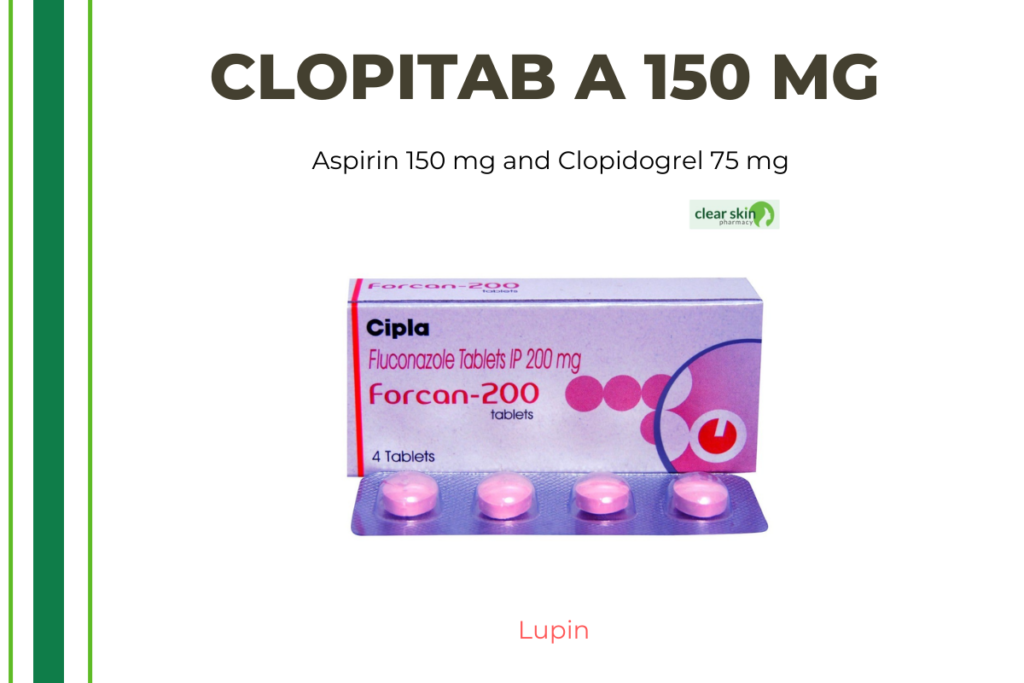Clopitab A 150
Clopitab A 150 is an antiplatelet medication used for the prevention of heart attacks and strokes. When a blood clot prevents blood from reaching the heart, a heart attack occurs. The most common cause of artery obstruction is the accumulation of fat, cholesterol, and other substances, which form a plaque in the arteries that feed the heart (coronary arteries). Angina, upper-body pain, perspiration, nausea, exhaustion, and respiratory difficulties are all symptoms of a heart attack.
Aspirin and clopidogrel are the two active ingredients in Clopitab A 150. Anti-platelet agents are blood-thinning medications that prevent the formation of blood clots in the arteries. Aspirin functions as a blood thinner or anti-platelet drug in low doses (around 75 mg) to prevent heart attack and stroke. Clopidogrel prevents blood clots in patients with severe chest distress (unstable angina or a heart attack), stroke, or peripheral artery disease (heart problem due to narrowed blood vessels). Clopitab A 150 increases blood flow, thereby preventing heart attacks, strokes, deep venous thrombosis (blood clots in veins), and pulmonary embolisms (blood clots in the arteries of lungs).
Clopitab A 150 is an orally administered medication. With a glass of water, the tablet should be swallowed whole. It must not be chewed, fractured, or bit. The frequency with which you should take your medications will be determined by your doctor based on your medical condition. Frequent adverse effects of Clopitab A 150 include abdominal pain, dyspepsia, diarrhea, bruising, and nosebleeds. Since Clopitab A 150 is known to induce dizziness and blurred vision, driving should be avoided while taking it. The majority of adverse effects of Clopitab A 150 do not require medical treatment and diminish over time. However, if the negative effects persist, consult a physician.
Make an effort to continue taking your medications. Stopping Clopitab A 150 could worsen your health and increase your risk of experiencing another heart attack. Inform your doctor if you have an allergy to clopidogrel or aspirin, kidney or liver disease, a bleeding disorder (such as peptic ulcers or cerebral hemorrhage), if you are pregnant or planning to become pregnant, or if you are breastfeeding. Before undergoing surgery or taking a new prescription, a patient taking Clopitab A 150 should inform their doctor.
Clopitab A 150 is used to prevent heart attacks and strokes, among other applications.

Medicinal Advantages
Aspirin and clopidogrel, two anti-platelet medications, are combined in Clopitab A 150 to prevent blood blockages in the arteries. Aspirin functions as a blood thinner or anti-platelet drug in low doses (around 75 mg) to prevent heart attack and stroke. Clopidogrel prevents blood clots in patients with severe chest distress (unstable angina or a heart attack), stroke, or peripheral artery disease (heart problem due to narrowed blood vessels). Clopitab A 150 increases blood flow, thereby preventing heart attacks, strokes, deep venous thrombosis (blood clots in veins), and pulmonary embolisms (blood clots in the arteries of lungs).
Utilize Directions
Clopitab A 150 is an orally administered medication. With a glass of water, the tablet should be swallowed whole. It must not be chewed, fractured, or bit. The frequency with which you should take your medications will be determined by your doctor based on your medical condition. Clopitab A 150 is most effective when taken as prescribed, preferably with food, and in conjunction with a healthy lifestyle (such as eating well and being active). Even if you feel fine, you should continue taking your medication unless your doctor instructs you otherwise.
Place in a cold, dry area out of direct sunlight.
Clopitab A 150 Adverse Reactions
Common adverse effects of Clopitab A 150 include abdominal pain, indigestion, diarrhea, bruising, nosebleeds, and an increased propensity to hemorrhage. Although not all of these side effects are likely to occur, you should seek immediate medical attention if they do.
Recommendations for Drugs
You should not take Clopitab A 150 if you are allergic to clopidogrel, aspirin, salicylates, or anti-inflammatory drugs. (pain medications). Inform your doctor if you have a condition that causes bleeding, such as hemophilia, a stomach ulcer, or bleeding in the cranium or gut. Clopitab A 150 should be used with caution in patients with hepatic or kidney disorders. Visit a physician prior to taking Clopitab A 150 if you have asthma, rhinitis, or nasal polyps. Clopitab A 150 should not be administered to a nursing mother because it passes into breast milk. Clopitab A 150 should not be given to minors younger than 12 years old because its safety and efficacy have not been established.
Interactions Among Medications
Blood thinners (warfarin, heparin, phenindione, ticlopidine), anti-psychotics (fluoxetine, fluvoxamine, moclobemide, lithium, sertraline, paroxetine), anti-diabetics (glipalamide, repaglinide), anti-cancer medications (paclitaxel, methotrexate), gout medications (probenecid), and anti-epilepsy medications (valproate, phen (efavirenz, ritonavir, cobicistat).
Alcohol can increase blood pressure, which can contribute to the development of cardiac disease. By avoiding oily foods, you can keep your cholesterol and triglyceride levels in check.
Inform your doctor if you have a history of drug allergies, heart disease, active bleeding disorders, asthma, a clot in a brain artery (ischemic stroke), liver, or renal disease before taking Aspirin and Clopidogrel.
Safety Recommendations
ALCOHOL
Consuming alcohol is hazardous because it can exacerbate negative effects such as vertigo and high blood pressure.
PREGNANCY
Aspirin and clopidogrel are contraindicated during pregnancy due to their teratogenic effects. Before taking aspirin and clopidogrel if you are planning to become pregnant or are already pregnant, you should consult your doctor.
BREAST FEEDING
Unknown are the effects of aspirin and clopidogrel on lactation. However, if you are breastfeeding, you should avoid taking aspirin and clopidogrel because they travel through breast milk and are harmful to the infant. Consult your physician before taking aspirin and clopidogrel together.
DRIVING
If dizziness or drowsiness occur while taking aspirin or Clopidogrel, do not drive or operate heavy machinery. Aspirin and Clopidogrel both cause blurred vision, so do not operate a motor vehicle if you are taking them. If the symptoms persist after a few days, consult a physician.
LIVER
Inform your doctor if you have a history of liver disease or hepatic impairment. Before prescribing Aspirin and Clopidogrel together, your physician will weigh the benefits and risks. However, it is not recommended for those with severe liver disease.
KIDNEY
Inform your doctor if you have a history of kidney problems. Before prescribing Aspirin and Clopidogrel together, your physician will weigh the benefits and risks. However, it is not recommended for those with advanced kidney disease.
No habits formed
Diet and Lifestyle Advice
Take the medication according to the doctor’s instructions and at regular intervals. Do not take any additional over-the-counter medications, herbal supplements, or vitamin supplements while taking Aspirin and Clopidogrel without first consulting your pharmacist or doctor.
Maintain healthy levels of cholesterol and triglycerides.
Consume a balanced meal abundant in fresh fruits and vegetables at regular intervals.
Alcohol consumption should be restricted because it raises blood pressure and increases the risk of cardiovascular disease.
To maintain a healthy heart, you must monitor your weight and engage in regular exercise.
Your physician will also instruct you on how to identify and treat the early symptoms of heart disease.
Additional Information: This item cannot be returned.
Priorities of Patients
A blood clot is a collection or clump of blood that transforms from liquid to gel-like state. Natural blood clotting prevents excessive blood loss in the event of an accident, trauma, surgery, or a wound. A blood clot that forms in the vessels does not always dissipate on its own and can become life-threatening.
When the brain is deprived of oxygen and blood, it begins to die within minutes, culminating in a heart attack or a stroke.
A blood blockage prevents blood from reaching the heart, causing a heart attack. The most common cause of artery obstruction is the accumulation of fat, cholesterol, and other substances, which form a plaque in the arteries that feed the heart (coronary arteries). During a heart attack, the oxygen-carrying blood supply to the heart is interrupted (myocardial infarction). The cardiac muscle perishes as a result. Angina, upper-body pain, perspiration, nausea, exhaustion, and respiratory difficulties are all symptoms of a heart attack.
FAQs
Aspirin and Clopidogrel combine to create Clopitab A 150. These blood thinners can increase the likelihood of hemorrhaging. It is advised that you exercise caution when shaving, cutting your fingernails, or using sharp instruments in the course of your daily activities. Additionally, prior to undergoing any procedure, please consult your physician.
Consult your physician if you must cease taking aspirin or clopidogrel prior to surgery. Aspirin and clopidogrel can increase the risk of bleeding, so your doctor may advise you to cease taking them a few days before surgery.
Dizziness is one of the negative effects of aspirin and clopidogrel. If you experience vertigo for an extended period of time, please consult a physician.
Aspirin and clopidogrel are contraindicated during pregnancy due to their teratogenic effects. Before taking aspirin and clopidogrel if you are planning to become pregnant or are already pregnant, you should consult your doctor.
Unknown are the effects of aspirin and clopidogrel on lactation. However, if you are breastfeeding, you should avoid taking aspirin and clopidogrel because they travel through breast milk and are harmful to the infant. Consult your physician before taking aspirin and clopidogrel together.
Consuming alcohol is hazardous because it can exacerbate negative effects such as vertigo and high blood pressure.
Aspirin combined with clopidogrel is generally safe for long-term use. It is most efficacious when administered over the course of months or even years. If you are at risk of developing a stomach ulcer while taking aspirin and clopidogrel, your physician may prescribe a treatment for stomach ulcers.
If you neglect a dose, administer it as soon as you remember. If your next scheduled dose is quickly approaching, skip the delayed dose and resume your normal dosing schedule.
If dizziness or drowsiness occur while taking aspirin or Clopidogrel, do not drive or operate heavy machinery. Aspirin and Clopidogrel both cause blurred vision, so do not operate a motor vehicle if you are taking them. If the symptoms persist after a few days, consult a physician.








Be the first to review “CLOPITAB A 150 MG 15 Tablets”